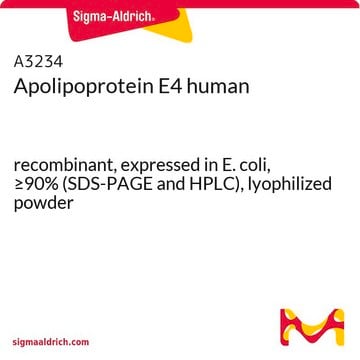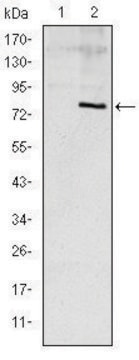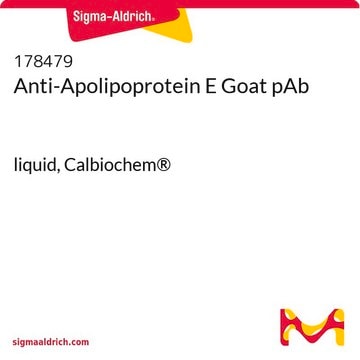MABN43
Anti-Apolipoprotein E4 (ApoE4) Antibody, clone 4E4
clone 4E4, from mouse
Synonym(s):
Apolipoprotein E, Apo-E, ApoE4, Apolipoprotein E4
About This Item
Recommended Products
biological source
mouse
Quality Level
antibody form
purified immunoglobulin
antibody product type
primary antibodies
clone
4E4, monoclonal
species reactivity
human
technique(s)
immunohistochemistry: suitable
immunoprecipitation (IP): suitable
western blot: suitable
isotype
IgG1κ
NCBI accession no.
UniProt accession no.
shipped in
wet ice
target post-translational modification
unmodified
Gene Information
human ... APOE(348)
General description
Specificity
Immunogen
Application
Immunoprecipitation Analysis: A representative lot was used by an independent laboratory to detect ApoE4 in CHO cells secreting ApoE4. (Image courtesy of Dr. Egon Ogris, Medical University of Vienna)
Neuroscience
Developmental Neuroscience
Quality
Western Blot Analysis: A 1:100,000 dilution detected ApoE4 in 10 µg of recombinant ApoE4 protein.
Target description
Physical form
Storage and Stability
Analysis Note
Recombinant Apolipoprotein E protein
Other Notes
Disclaimer
Not finding the right product?
Try our Product Selector Tool.
Storage Class Code
12 - Non Combustible Liquids
WGK
WGK 1
Flash Point(F)
Not applicable
Flash Point(C)
Not applicable
Certificates of Analysis (COA)
Search for Certificates of Analysis (COA) by entering the products Lot/Batch Number. Lot and Batch Numbers can be found on a product’s label following the words ‘Lot’ or ‘Batch’.
Already Own This Product?
Find documentation for the products that you have recently purchased in the Document Library.
Our team of scientists has experience in all areas of research including Life Science, Material Science, Chemical Synthesis, Chromatography, Analytical and many others.
Contact Technical Service








